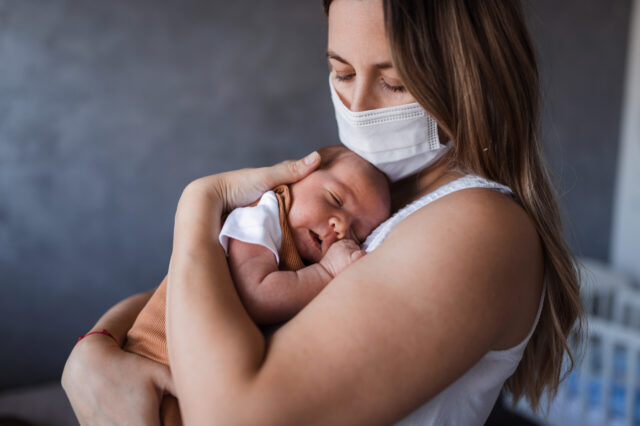Definition
COVID-19 vaccines are used to prepare the body's immune system to protect against COVID-19. These vaccines are a vital tool to help stop the COVID-19 pandemic.
Everyone ages 6 months and older should get a COVID-19 vaccination. This includes people who are pregnant and those planning to become pregnant. You should get a COVID-19 vaccine even if you have already had COVID-19.
Alternative Names
Vaccines for COVID-19; COVID - 19 vaccinations; COVID-19 shots; Vaccinations for COVID-19; COVID-19 immunizations; COVID-19 prevention - vaccines; mRNA vaccine - COVID; COVID-19 vaccine booster shots; Booster shots for COVID-19
Information
HOW COVID-19 VACCINES WORK
COVID-19 vaccines protect people from getting COVID-19 and from getting more severe symptoms if they get COVID-19. These vaccines "teach" your body how to defend against the SARS-CoV-2 virus, which causes COVID-19.
COVID-19 vaccines have been shown to do a very good job of:
- Preventing infection with the SARS-CoV-2 virus, which causes COVID-19
- Protecting against serious illness, hospitalization, and death from COVID-19
- Reducing the risk of people spreading COVID-19
mRNA VACCINES
The mRNA vaccines approved in the United States work differently from many other vaccines.
- COVID-19 mRNA vaccines use messenger RNA (mRNA) to tell cells in the body how to briefly create a harmless piece of "spike" protein that is unique to the SARS-CoV-2 virus. Cells then get rid of the mRNA.
- This "spike" protein triggers an immune response inside your body, making antibodies that protect against COVID-19. Your immune system then learns to attack the SARS-CoV-2 virus if you are ever exposed to it.
- There are two mRNA COVID-19 vaccines currently approved for use in the United States, the Pfizer-BioNTech and the Moderna COVID-19 vaccines.
The COVID-19 mRNA vaccine is given as an injection (shot) in the arm in 2 doses.
- If you get the Pfizer-BioNTech COVID-19 vaccine, you should get your second shot about 21 days (3 weeks) after the first shot.
- If you get the Moderna COVID-19 vaccine, you should get your second shot about 28 days (4 weeks) after the first shot.
- Some people ages 18 to 39 years may receive the second shot 8 weeks after the first shot (especially males). This may help reduce the risk of certain rare side effects.
People who have a weak immune system (immunocompromised) should get an additional dose at least 28 days after their second shot of either the Pfizer-BioNTech or Moderna mRNA vaccine. This includes people receiving certain types of cancer treatment and people taking medicines that suppress the immune system. Ask your doctor if you are not sure. Getting a third dose will improve the response to the vaccine in people with weak immune systems.
Children ages 6 months to age 17 years can get either the Pfizer-BioNTech or the Moderna vaccine. The COVID-19 vaccine given to children and teens has the same active ingredients as the vaccine given to adults. Dosage is based on the child's age on the day of vaccination. It is not based on the child's size or weight.
- Children ages 6 months to 4 years can receive 3 doses of the Pfizer-BioNTech vaccine or 2 doses of the Moderna vaccine.
- Children ages 5 to 17 years can receive 2 doses of the Pfizer-BioNTech vaccine or 2 doses of the Moderna vaccine.
It takes time for your child's immune system to start protecting them after receiving the vaccine. Children are considered fully vaccinated 2 weeks after receiving the last shot in the vaccine series.
OTHER VACCINES
The Novavax vaccine is a protein subunit vaccine. The vaccine includes harmless pieces of the "spike" protein that causes COVID-19. The vaccine triggers the body to develop antibodies to protect you from the virus.
The Novavax vaccine is given as an injection (shot) in the arm in 2 doses, given 3 to 8 weeks apart to adults and to children ages 12 to 17 years.
The Johnson and Johnson's Janssen (J&J/Janssen) COVID-19 vaccine is a viral vector vaccine. It is given as one shot. It has been approved for use in adults ages 18 and older in the United States in some cases:
- If you are unable to have an mRNA (due to a severe allergic reaction)
- If an mRNA vaccine is unavailable
- If you want to have the J&J/Janssen vaccine despite safety concerns
It takes time for your immune system to start protecting you after receiving the vaccine. You are considered fully vaccinated:
- 2 weeks after your second shot of the Pfizer-BioNTech, Moderna, or Novavax vaccine
- 2 weeks after your one shot of the J&J/Janssen vaccine
VACCINE MYTHS
COVID-19 vaccines:
- DO NOT contain any live virus, and they cannot give you COVID-19
- DO NOT affect or interfere with your genes (DNA)
- DO NOT affect or interfere with pregnancy, nor do they make you infertile
To get up-to-date accurate information about COVID-19 vaccines, go to the Centers for Disease Control and Prevention (CDC) website:
- Vaccines for COVID-19 - www.cdc.gov/coronavirus/2019-ncov/vaccines/index.html
- Myths and facts about COVID-19 vaccines - www.cdc.gov/coronavirus/2019-ncov/vaccines/facts.html
VACCINE SIDE EFFECTS
While COVID-19 vaccines will not make you sick, they may cause certain side effects and flu-like symptoms. This is normal. These symptoms are a sign that your body is making antibodies against the virus. Common side effects include:
- Pain, redness, or swelling on the arm where you got the shot
- Tiredness
- Headache
- Muscle pain
- Chills
- Fever
- Nausea
Side effects from the shot may affect your ability to do daily activities, but they will go away in a few days. Even if you have side effects, you should get the second shot. Any side effects from the vaccine are far less dangerous than the potential for serious illness or death from COVID-19.
HOW TO GET THE VACCINE
There are several ways you can look for vaccination providers near you.
- Ask your child's health care provider if they offer COVID-19 vaccines.
- Contact your local health department.
- Go to the CDC VaccineFinder.
- Text your zip code to 438829 or call 1-800-232-0233 to find vaccine locations near you.
- Check your local pharmacy's website to see if vaccination appointments are available. Find out which pharmacies are participating in the Federal Retail Pharmacy Program.
Learn what to expect when you get your COVID-19 vaccine.
VACCINE SAFETY
The safety of vaccines is the top priority, and COVID-19 vaccines have passed rigorous safety standards before approval. Millions of people have received the vaccine, and no long-term side effects have been reported. They continue to be closely monitored to ensure they are safe and effective.
There have been reports of some people who have had an allergic reaction to the current vaccines. So it is important to follow certain precautions:
- If you have ever had a severe allergic reaction (anaphylaxis) to a particular type of COVID-19 vaccine, you should not get that vaccine. You may be able to get another type of COVID-19 vaccine.
- If you have a non-severe allergic reaction after getting the first shot of the COVID-19 vaccine, you may be able to get another dose in some cases. Your health care provider may refer you to an allergy and immunology provider for care.
- If you only had a skin rash on the arm you got the shot (COVID arm), you should still get additional shots.
If you have had an allergic reaction, even if not severe, to other vaccines or injectable therapies, you should ask your health care provider if you should get a COVID-19 vaccine. Your provider will help you decide if it is safe to get vaccinated.
Adverse events after COVID-19 vaccination are very rare.
- An unusual blood clotting disorder called thrombosis with thrombocytopenia syndrome (TTS) has been very rarely seen (4 cases per million doses) after the J&J/Janssen vaccine.
- Guillain-Barré syndrome may also very rarely occur with the Johnson and Johnson/Janssen vaccine.
- Myocarditis and pericarditis (inflammation of the heart muscle or lining) may very rarely occur (52 to 106 cases per million doses) in young people receiving one of the mRNA vaccines. This condition responds well to rest and medicine and most people recover completely without any lasting effects.
- Severe allergic reaction is rare and can be treated right away after receiving the vaccination.
All these associations are so rare that they should not cause hesitation in receiving any of these vaccines.
CDC recommends that people may still get vaccinated if they have a history of:
- Severe allergic reactions NOT related to vaccines or injectable medicines -- such as food, pet, venom, environmental, or latex allergies
- Allergies to oral medicines or a family history of severe allergic reactions
To learn more about COVID-19 vaccine safety, go to the CDC website:
- Ensuring COVID-19 Vaccine Safety in the United States -- www.cdc.gov/coronavirus/2019-ncov/vaccines/safety.html
- V-Safe After Vaccination Health Checker -- www.cdc.gov/coronavirus/2019-ncov/vaccines/safety/vsafe.html
VACCINE BOOSTER SHOTS
Over time, COVID-19 vaccines appear to become less protective against the virus. Getting a booster dose helps provide additional protection against COVID-19. As a result, a booster shot is now recommended for all people age 6 months and older.
If you received the Pfizer-BioNTech or Moderna mRNA vaccine, you can get a booster dose 2 months after receiving your second dose of the initial vaccine. You have the option to choose either the Pfizer-BioNTech or Moderna mRNA vaccine for your booster dose, regardless of which vaccine you first received.
If you received the Noravax or J&J/Janssen vaccine, you should get a booster dose (Pfizer-BioNTech or Moderna) 2 months after receiving your initial vaccine.
It is recommended to get an mRNA vaccine (Pfizer-BioNTech or Moderna) for your booster dose, regardless of which vaccine you first received. The J&J/Janssen and Novavax vaccine booster doses are available only in certain situations.
Adults ages 50 years and older and people who are immunocompromised can get a second booster dose (Pfizer-BioNTech or Moderna) at least 4 months after the 1st booster dose.
The CDC has further information about COVID-19 vaccine booster shots.
WHAT YOU CAN DO ONCE YOU ARE FULLY VACCINATED
We are still learning how well vaccines help prevent COVID-19 from spreading and how long the protection they provide lasts. Until more is known, using vaccines, masks, and taking other steps to help protect yourself and others is the best way to stay safe and healthy.
References
Centers for Disease Control and Prevention website. Benefits of getting a COVID-19 vaccine. www.cdc.gov/coronavirus/2019-ncov/vaccines/vaccine-benefits.html. Updated December 22, 2022. Accessed January 24, 2023.
Centers for Disease Control and Prevention website. Stay up to date with COVID-19 vaccines including Boosters. www.cdc.gov/coronavirus/2019-ncov/vaccines/stay-up-to-date.html. Updated January 25, 2023. Accessed February 27, 2023.
Centers for Disease Control and Prevention website. COVID-19 vaccines for moderately to severely immunocompromised people. www.cdc.gov/coronavirus/2019-ncov/vaccines/recommendations/immuno.html. Updated February 24, 2023. Accessed February 27, 2023.
Centers for Disease Control and Prevention website. COVID-19 vaccines for people who would like to have a baby. www.cdc.gov/coronavirus/2019-ncov/vaccines/planning-for-pregnancy.html. Updated July 14, 2022. Accessed January 24, 2023.
Centers for Disease Control and Prevention website. Use of COVID-19 vaccines in the United States. Interim clinical considerations. www.cdc.gov/vaccines/covid-19/clinical-considerations/covid-19-vaccines-us.html. Updated January 27, 2023. Accessed February 27, 2023.
Centers for Disease Control and Prevention website. Myths and facts about COVID-19 vaccines. www.cdc.gov/coronavirus/2019-ncov/vaccines/facts.html. Updated February 16, 2023. Accessed February 27, 2023.
Centers for Disease Control and Prevention website. Allergic reactions after COVID-19 vaccination. www.cdc.gov/coronavirus/2019-ncov/vaccines/safety/allergic-reaction.html. Updated July 20, 2022. Accessed January 24, 2023.
Center for Disease Control and Prevention website. COVID-19: Selected adverse events reported after COVID-19 vaccination. www.cdc.gov/coronavirus/2019-ncov/vaccines/safety/adverse-events.html. Updated February 27, 2023. Accessed February 27, 2023.


